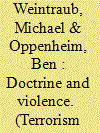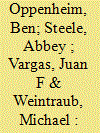|
|
|
Sort Order |
|
|
|
Items / Page
|
|
|
|
|
|
|
| Srl | Item |
| 1 |
ID:
134988


|
|
|
|
|
| Summary/Abstract |
Illegal organizations, like mafia syndicates, gangs, and insurgencies, are often highly cohesive and hostile toward the outside world. Such groups cultivate a particular form of “anti-social” capital, which relies on ingroup bonding and limits outgroup bridging for the purpose of commissioning illicit acts. We argue that experiences within the group leave members with varying intensities of anti-social capital, and that higher intensities lead to significantly weaker relationships with political institutions and civil society, even many years after they exit the group. We test this theory using survey data from 1,485 former members of insurgent and paramilitary groups in Colombia, along with insights from 68 qualitative interviews. We find strong evidence that anti-social capital has individually varying and sticky effects on former members. These effects are pervasive and intense, and exhibit surprising and counterintuitive properties: former members of pro-state militia with higher levels of anti-social capital are systematically less likely to trust political institutions, while members of peasant-based insurgent groups with high levels of anti-social capital are less likely to participate in their communities.
|
|
|
|
|
|
|
|
|
|
|
|
|
|
|
|
| 2 |
ID:
156919


|
|
|
|
|
| Summary/Abstract |
Military theorists and practitioners have long argued that training shapes how combatants treat civilians during war. Yet there is little systematic evidence regarding the impact of training on wartime behavior, and almost none for non-state armed groups, despite the fact that such groups intensively train their fighters in order to shape their behavior towards civilian populations. This article argues that among insurgent groups that emphasize the strategic and tactical importance of restraint towards civilian populations, political training can reduce civilian killings. We test the observable implications of our theory in the case of Colombia, using survey data on former Revolutionary Armed Forces of Colombia (FARC) insurgents and sub-national data on civilian killings. We find support for our hypothesis, with results that are robust to a range of model specifications and controls, including alternate sources of combatant discipline and obedience, such as military training and punishment.
|
|
|
|
|
|
|
|
|
|
|
|
|
|
|
|
| 3 |
ID:
157361


|
|
|
|
|
| Summary/Abstract |
Rumors run rife in areas affected by political instability and conflict. Their adoption plays a key role in igniting many forms of violence, including riots, ethnic conflict, genocide, and war. While unverified at the time of transmission, some rumors are widely treated as truth, while others are dismissed as implausible or false. What factors lead individuals to embrace rumors and other forms of unverified information? This article presents a new theoretical framework for understanding individual receptivity to rumors and tests it using original survey data gathered in insurgency-affected areas of Thailand and the Philippines. We find wide variation in rumor adoption, and argue that three factors drive individuals to embrace rumors: worldview, threat perception, and prior exposure. Contrary to conventional wisdom, we find no evidence that commonly cited factors—including education, income, age, and gender—determine individual receptivity to rumors. We also explore the implications of belief in rumors on conflict dynamics. We find that greater receptivity to rumors correlates with the belief that ongoing conflict is intractable. This suggests that rumors can not only help spark political violence, but also impede its resolution. Our findings shed light on the complex interaction between worldview and unverified information in shaping popular beliefs—and through them, political contention and competition—in conflict areas and beyond.
|
|
|
|
|
|
|
|
|
|
|
|
|
|
|
|
| 4 |
ID:
141181


|
|
|
|
|
| Summary/Abstract |
Anti-insurgent militias and states attempt to erode insurgent groups’ capacities and co-opt insurgent fighters by promising and providing benefits. They do so to create a perception that the insurgency is unraveling and to harness inside information to prosecute more effective counterinsurgency campaigns. Why do some insurgents defect to a paramilitary group and others exit the war by demobilizing, while still others remain loyal to their group? This article presents the first empirical analysis of these questions, connecting insurgents’ motivations for joining, wartime experiences, and organizational behavior with decisions to defect. A survey of ex-combatants in Colombia shows that individuals who joined for ideological reasons are less likely to defect overall but more likely to side-switch or demobilize when their group deviates from its ideological precepts. Among fighters who joined for economic reasons, political indoctrination works to decrease their chances of demobilization and defection to paramilitaries, while opportunities for looting decrease economically motivated combatants’ odds of defection.
|
|
|
|
|
|
|
|
|
|
|
|
|
|
|
|
|
|
|
|
|